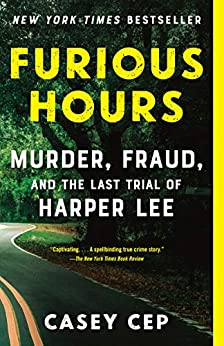More on this book
Community
Kindle Notes & Highlights
by
Casey Cep
Read between
May 22 - May 25, 2020
only a few homes, a couple of stores, and at least that many churches, since white and black believers required separate sanctuaries and the Methodists and the Baptists wouldn’t worship together, either.
respiratory infections spread like rumors of deployment.
Men of the cloth may have more cause than most to avoid indiscretions, but they also have more opportunities to commit them.
Violence has a way of destroying everything but itself. A murdered person’s name always threatens to become synonymous with her murder; a murdered person’s death always threatens to eclipse her life.
Like more than a few preachers’, they learned, his private life bore little resemblance to the one his parishioners thought he was living, and no resemblance at all to those he extolled in his sermons.
the appropriately fiery name of Nicholas If-Christ-Had-Not-Died-for-Thee-Thou-Hadst-Been-Damned Barebone. (The hortatory name had been given to him by his father, the millenarian preacher Praise God Barebone.)
God, who kept watch even over the sparrow, would provide, and to doubt those provisions by making one’s own end-of-life preparations was thought to reveal a lack of faith.
Mouths don’t empty themselves unless the ears are sympathetic and knowing.”
Supernatural explanations flourish where law and order fails, which is why, as time passed and more people died, the stories about the Reverend grew stronger, stranger, and, if possible, more sinister.
Ghost bells, war cries, the clanging of slave chains: if ever a land came by its haunting honestly, it is eastern Alabama.
The third Mrs. Maxwell was Ophelia Burns: the woman who had been indicted but never tried for the murder of the first Mrs. Maxwell.
He could find the race card in any deck and played it against everyone who dissented from his white-supremacist brand of populism.
He was reading widely, thinking about the past, and praying about the future.
As a rule, most southern towns are allergic to authority and resent any federal presence that isn’t a post office.
Between the grieving relatives, the other mourners, the curiosity seekers, the press, and the police, there was not that much peace and goodwill that day at Peace and Goodwill.
She had said a total of twelve words on the record, seven of which were, “We are bound by a common anguish.”
Movies might have cost a dime, but trials were free.
When it finally came time for Nelle to open her gift, the Browns pointed to an envelope hanging among the tinsel and ornaments on their tree. Inside it was a sizable check made payable to Lee, together with a note that read, “You have one year off from your job to write whatever you please.” — It was the most shocking Christmas gift of Lee’s life and, as it would turn out, one of the most momentous in the history of American literature.
She had known countless men like the Atticus of Watchman, who would defend a black man in court only to bar him from the ballot box, not to mention the neighboring booth or bar stool. In fact, the majority of whites in Alabama would never have joined a lynch mob, yet openly opposed the integration of schools, or anything else.
For Capote, they were a story; for Lee, they were a family.
“He writes not to communicate with other people,” Lee said of any writer worth his salt, “but to communicate more assuredly with himself.”
Writing, Lee argued, was a never-ending self-exploration for the writer, “an exorcism of not necessarily his demon, but of his divine discontent.”
“More tears are shed over answered prayers than unanswered ones.”
It was in that interview that Lee said of them, evocatively and enigmatically, “We are bound by a common anguish.”
Once, during a performance of Mozart by the pianist Alicia de Larrocha, Jim saw her “politely correct a young man seated next to us who was moving his hand to the music in the wrong time signature.”
her five favorite novels: Samuel Butler’s The Way of All Flesh, Henry Fielding’s Tom Jones, Proust’s Remembrance of Things Past, Richard Hughes’s High Wind in Jamaica, and Mark Twain’s Huckleberry Finn.
History isn’t what happened but what gets written down, and the various sources that make up the archival record generally overlooked the lives of poor black southerners.
Lee could trace Tom Radney’s entire career, along with his family’s success and service, in The Alexander City Outlook, but when she went looking for anything about the Reverend Maxwell, she found only his crimes.
“Self-pity is a sin,” she told a reporter in 1963, already frustrated, only three years after Mockingbird. “It is a form of living suicide.”


